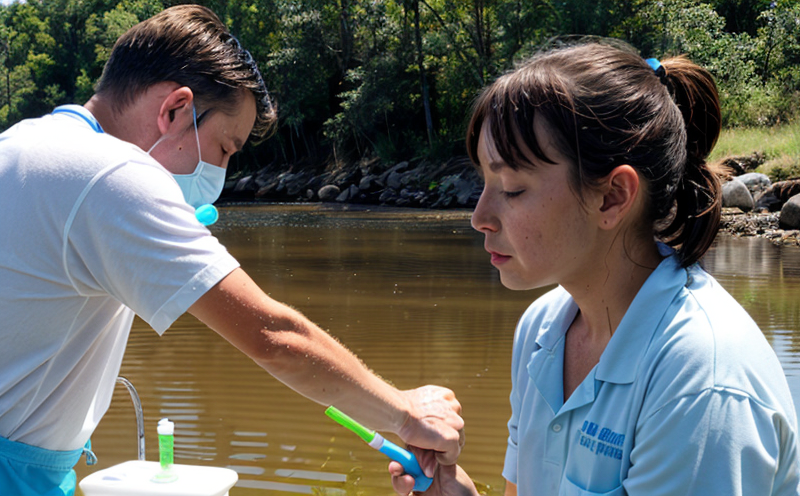ASTM D512 Chloride Ion Test in Water Validation Method Development Test
The ASTM D512 chloride ion test in water is a standardized procedure used to determine the concentration of chloride ions present in water samples. This method plays a crucial role in environmental monitoring and quality control, ensuring that water resources meet stringent regulatory standards for health and safety.
Chloride ion concentrations are particularly important because they can indicate contamination from various sources such as industrial discharges, agricultural runoff, or natural seepage. In many countries, including the United States, chloride limits are set in drinking water regulations to protect public health and prevent corrosion of infrastructure like pipes and storage tanks.
The ASTM D512 method is widely recognized for its accuracy and reliability across various industries, from municipal water treatment facilities to industrial processes that rely on clean water. Compliance with this standard can significantly enhance a company’s reputation for environmental responsibility and regulatory compliance.
Our service focuses on the development of validation methods for chloride ion testing in water using ASTM D512. This includes ensuring method robustness, precision, and accuracy under diverse conditions, which is critical for reliable quality assurance and control processes.
The process begins with comprehensive sample preparation, where we ensure that each water sample adheres to strict protocols for volume, temperature, and mixing techniques. Following this, the samples are analyzed using advanced analytical instrumentation such as potentiometric titration or ion-selective electrodes.
Our team of experts works closely with clients to understand their specific needs and integrate ASTM D512 into a broader quality control strategy. This can include developing custom test protocols for unique water sources or enhancing existing testing procedures to meet evolving regulatory requirements.
The validation process involves comparing the results obtained from ASTM D512 with those from alternative methods, ensuring consistency and accuracy across different analytical techniques. This step is crucial in establishing confidence in the method's performance under various conditions.
By leveraging our expertise in environmental testing, we provide clients with robust validation services that not only meet but exceed industry standards. Our approach ensures that clients can trust their chloride ion test results, leading to better-informed decision-making and enhanced operational efficiency.
Scope and Methodology
| Aspect | Description |
|---|---|
| Sample Preparation | Ensures that water samples are handled under controlled conditions to prevent contamination or alteration of chloride ion concentrations. |
| Analytical Techniques | Involves the use of potentiometric titration and ion-selective electrodes for accurate chloride ion concentration determination. |
| Validation Protocols | Compares ASTM D512 results with alternative methods to ensure consistency and reliability across different analytical techniques. |
| Data Analysis | Involves statistical evaluation of test data to confirm the method's precision, accuracy, and robustness. |
| Report Generation | Generates comprehensive reports detailing all testing parameters, results, and conclusions for clients' review. |
International Acceptance and Recognition
The ASTM D512 chloride ion test is highly regarded internationally due to its stringent quality assurance protocols and consistent performance across various environments. Its widespread acceptance in regulatory bodies worldwide ensures that the results are credible and can be used for compliance purposes.
Municipal water utilities, industrial facilities, and environmental agencies around the globe rely on ASTM D512 as a benchmark for chloride ion testing. This standard is often cited in international standards such as ISO 9746, which sets global guidelines for water quality assessment.
The method's robustness and reliability have made it a preferred choice for organizations seeking to ensure that their water supplies meet the highest quality standards. By adhering to ASTM D512, companies can demonstrate their commitment to environmental sustainability and public health, thereby enhancing their reputation in the global market.
Environmental and Sustainability Contributions
The ASTM D512 chloride ion test method is a cornerstone of sustainable water management practices. By accurately measuring chloride ion concentrations, this method helps prevent contamination that can lead to environmental degradation and public health risks.
Incorporating ASTM D512 into routine testing protocols ensures that water resources are protected from harmful contaminants, promoting the long-term sustainability of these critical resources. This standard also supports efforts to reduce industrial impacts on local ecosystems by providing reliable data for decision-making processes.
Through our validation services using ASTM D512, we contribute significantly to environmental stewardship. By ensuring that chloride ion concentrations are accurately monitored and controlled, we help mitigate risks associated with water contamination. This proactive approach aligns with broader sustainability goals, fostering a healthier planet for future generations.





